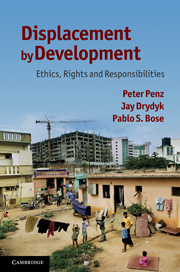Book contents
- Frontmatter
- Contents
- List of tables
- Acknowledgements
- 1 Introduction
- PART I FUNDAMENTALS
- PART II FROM COST–BENEFIT ANALYSIS TO ETHICS
- PART III FROM VALUES TO RESPONSIBILITIES
- 7 Ethical outcomes
- 8 Ethical procedures
- 9 From rights to responsibilities
- 10 International responsibilities and rights regarding displacement
- PART IV REALIZING RESPONSIBILITIES
- Bibliography
- Index
9 - From rights to responsibilities
Published online by Cambridge University Press: 05 June 2012
- Frontmatter
- Contents
- List of tables
- Acknowledgements
- 1 Introduction
- PART I FUNDAMENTALS
- PART II FROM COST–BENEFIT ANALYSIS TO ETHICS
- PART III FROM VALUES TO RESPONSIBILITIES
- 7 Ethical outcomes
- 8 Ethical procedures
- 9 From rights to responsibilities
- 10 International responsibilities and rights regarding displacement
- PART IV REALIZING RESPONSIBILITIES
- Bibliography
- Index
Summary
The ethical failings articulated in Chapters 7 and 8 and made concrete by the case of displacement by the Jamuna Bridge project in Bangladesh refer to harm done to people. They are ethical failings, in that such harm is not justifiable. One approach could be merely to make this a matter of objectionable policy. However, the emergence of democracy has historically been accompanied by a movement to protect people against certain forms of harm by giving them protective rights. These are rights vis-à-vis authorities, firstly rights protecting against certain harmful state actions, but typically also rights to certain state provisions, such as basic food rations, social insurance, schooling and health care. Such rights may be legal rights, in that they have been incorporated in law and obtain their force from the established authorities, such as legislatures. Human rights, by contrast, begin their existence as morally justified claims. Even before they are practically protected, they ought to be protected, and it is wrong to violate them. They retain this normative force especially when they are devastatingly violated. Atrocities reveal that human rights may be inadequately protected, but the wrongness of violating them is unaltered. Ideally, rights are both morally justified claims and embedded in law. In the last two chapters, we discussed the normative foundations of four rights regarding displacement for development. In this chapter we begin to discuss the distribution of responsibilities that is required to realize those rights in practice. They are presented in Table 9.1.
- Type
- Chapter
- Information
- Displacement by DevelopmentEthics, Rights and Responsibilities, pp. 210 - 242Publisher: Cambridge University PressPrint publication year: 2011



